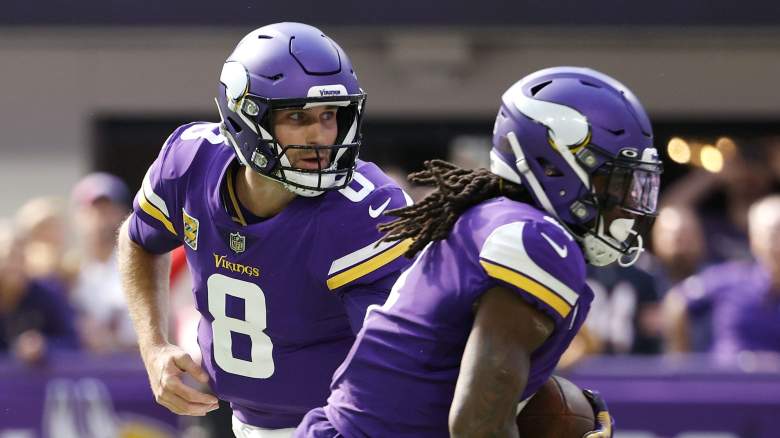
Getty Vikings quarterback Kirk Cousins left the door open for Dalvin Cook to re-sign with Minnesota, admitting he's hoping for the star running back's return.
Running back is one of the NFL‘s most fickle positions with the wear and tear ball carriers face every week.
In his third season, Todd Gurley led the league with 2,093 yards from scrimmage in 2017, earning Offensive Player of the Year honors. He played just three more seasons in the NFL after taking the Los Angeles Rams to the Super Bowl that year.
Peyton Hillis played himself onto the cover of Madden NFL 12 with a splashy third season, only to see his career end four years later with concussions and hamstring issues piling up.
After averaging 1,421 rushing yards a season as a three-year starter, Arian Foster had just one more 1,000-plus yard rushing performance in his final four years in the league.
While Minnesota Vikings fans were graced by the ageless wonder in Adrian Peterson, few running backs can stand the road-grating test of time the NFL inflicts at the position.
And Dalvin Cook, entering their sixth year in the NFL, is approaching a significant decline most running backs experience. Meanwhile, his contract is headed in an opposite direction — lending one analyst to call him the “new” Kirk Cousins on the Vikings’ cap sheet.
Dalvin Cook the ‘New’ Kirk Cousins on Vikings’ Salary Cap
On an October 10 airing of the SKOR North podcast, Judd Zulgad likened Cook to Cousins — given Cook’s performance may not match an inflated price tag by next season.
“I’ve grown to like how he’s being used for his current skill set, but you know what, he is the new Kirk,” Zulgad said of Cook. “There’s nothing wrong with him, it’s great to have him, but the contract — now that’s the issue.”
Cook, who signed a five-year, $63.0 million contract extension before the start of the 2020 season, had much of his earnings pushed to the tail end of the contract. His average cap hit for the first two seasons of the deal was $4.9 million.
But for the final four years of Cook’s contract, he carries an average $14.0 million cap hit per season, according to Over the Cap. The deal made Cook the fourth highest-paid running back in the league — behind only Christian McCaffrey, Alvin Kamara and Ezekiel Elliott. All of these backs have extensive injury history or are reaching a similar state of regression in their careers.
After a slow start to the season, Cook flashed his playmaking prowess, racking up a season-high 121 all-purpose yards and two rushing touchdowns in a win over the Chicago Bears in Week 5. However, he hasn’t shown the same breakaway speed he once had.
Cook is facing eight-man fronts at a career-low 8.6% of his rushing attempts with the emergence of Justin Jefferson and a new offensive scheme. However, he remains negative in rushing yards over expected (RYOE) for the first time in his career, per NFL Next Gen Stats. His longest run from scrimmage this season is 16 yards.
Cook is still a solid running back and contributor to the offense, but next offseason presents an opportunity to get out of his contract. The Vikings could save $11 million on the cap next season by either cutting or trading Cook, who will be 28, after June 1.
Another option would be to restructure his contract.
PFF Shows Running Backs Drop Off After 2nd Contracts
Last year, Pro Football Focus (PFF) took a deep dive into debunking ideas around running back regression in the NFL.
What the NFL analytics giant found was a few truths around a few key landmarks in a running back’s career.
Running backs tend to drop off after their rookie contracts. PFF found a significant drop off in RYOE from running backs who play past the first four years of their rookie deal. There’s also “survivorship bias” in these findings because the only running backs who see second contracts in the NFL are typically the most efficient.
So for running backs who are fortunate enough to stay in the league beyond four years, the fifth season is where regression begins.
Baked into that fifth year is usage, and running backs tend to see regression soon after hitting 1,500 carries in the NFL.
“In the PFF era, there have been 27 seasons where a running back had at least 1,500 carries going into the season — only seven of those seasons resulted in positive RYOE,” PFF’s Tej Seth wrote. “The trendline is clear once a running backs gets that many carries — he usually shows signs of regressing.”
Age also happens to be a factor.
“By the time running backs hit 27, they are usually past the prime of their careers,” Seth added.
Cook is currently 27 years old and playing in his sixth season, however, he played just four games his rookie year after tearing his ACL.
He entered the 2022 season with 1,018 career rushes, roughly two seasons of work below the 1,500-carry threshold where there is an expected drop-off.